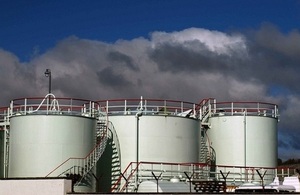CMA consults on stronger commitments to improve access to road fuels market in the Western Isles
The CMA has today launched a short consultation on changes to the commitments originally proposed by Certas Energy UK Ltd (‘Certas’) to improve competition in the supply of petrol and diesel to filling stations in the Western Isles of Scotland.

Fuel tanks
The CMA (and previously the Office of Fair Trading) has been investigating a possible infringement of competition law in the islands, relating in particular to the contractual arrangements between Certas and certain filling stations for the wholesale supply of road fuels.
The OFT announced in March 2014 that it was consulting on commitments proposed by Certas that were designed to address its competition concerns. The CMA has engaged with Certas on the substantial number of comments received in response to the consultation and as a result the company has offered to make the following changes to the commitments:
- the proposed throughput arrangements for the Stornoway terminal will last five rather than just two-and-a-half years (starting on 1 June 2015 and ending on 31 May 2020);
- an additional commitment that ensures the costs of operating the terminal will apply equally to Certas and its competitors to ensure a level playing field
The CMA is minded to accept modified commitments that incorporate these changes, and is inviting interested third parties to comment.
Ann Pope, CMA Senior Director, Anti-Trust, said:
We believe that these revised commitments have the potential to help rival fuel distributors to enter the market and to compete with Certas for the supply of road fuels to Western Isles filling stations on a long-term basis.
Any person wishing to comment on the proposed modifications to the commitments should submit their views to the CMA by 5pm on 4 June 2014 to:
Western Isles Fuel Commitments Consultation
Competition and Markets Authority
Victoria House
Southampton Row
London WC1B 4AD
WIFCConsultation@cma.gsi.gov.uk
Notes
- You can see all updates on this case on the project webpage.
- The Competition Act 1998 empowers the CMA to accept such binding commitments from parties under investigation as it considers appropriate to address the CMA’s competition concerns. Where the CMA proposes to accept the commitments offered, it will consult those who are likely to be affected by them and give them an opportunity to give the CMA their views. Where the parties to the investigation subsequently offer revised commitments which include modifications which the CMA considers to be material, the CMA will allow another opportunity for any interested third parties to express their views. The CMA will take any representations of third parties into account before taking a final decision on whether or not to accept the proposed commitments as modified.
- When the CMA has formally accepted commitments, it must close its investigation into the agreements that were the subject of the investigation. The CMA may re-open its investigation and take other action in certain limited circumstances (for example, where it has reasonable grounds for believing that there has been a material change of circumstances since the commitments were accepted).
- Any decision by the CMA accepting binding commitments will not constitute a determination as to the legality or otherwise of the conduct by the parties under investigation either prior to acceptance of the commitments or once the commitments are in place.
- The CMA is the UK’s primary competition and consumer authority. It is an independent non-ministerial government department with responsibility for carrying out investigations into mergers, markets and the regulated industries and enforcing competition and consumer law. From 1 April 2014 it took over the functions of the CC and the competition and certain consumer functions of the OFT, as amended by the Enterprise and Regulatory Reform Act 2013.
Photo above by Windy_ on Flickr. Used under Creative Commons, photo resized.